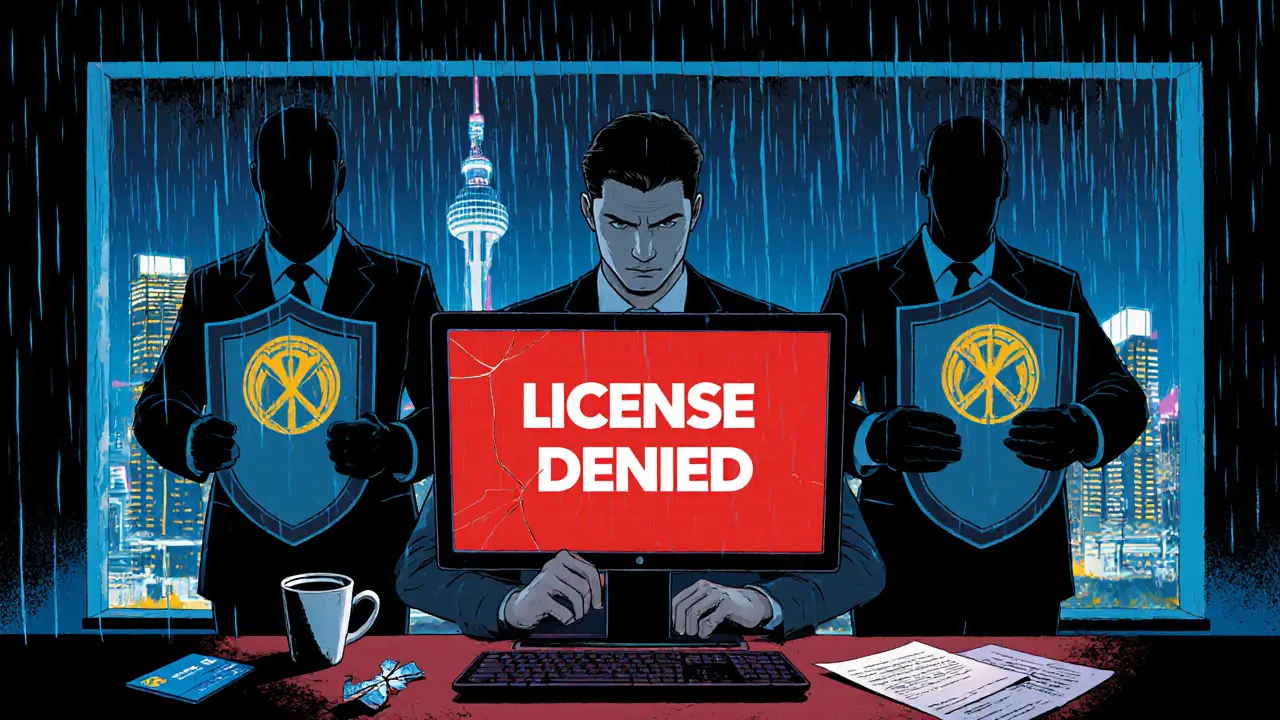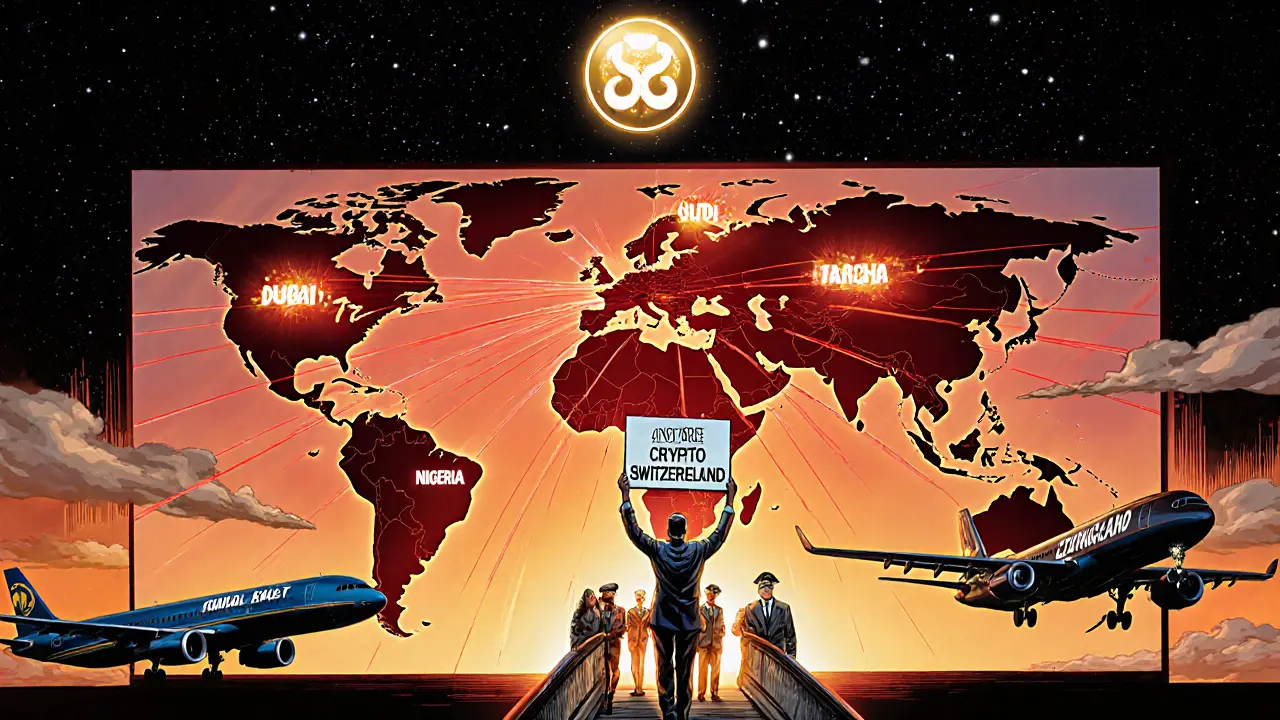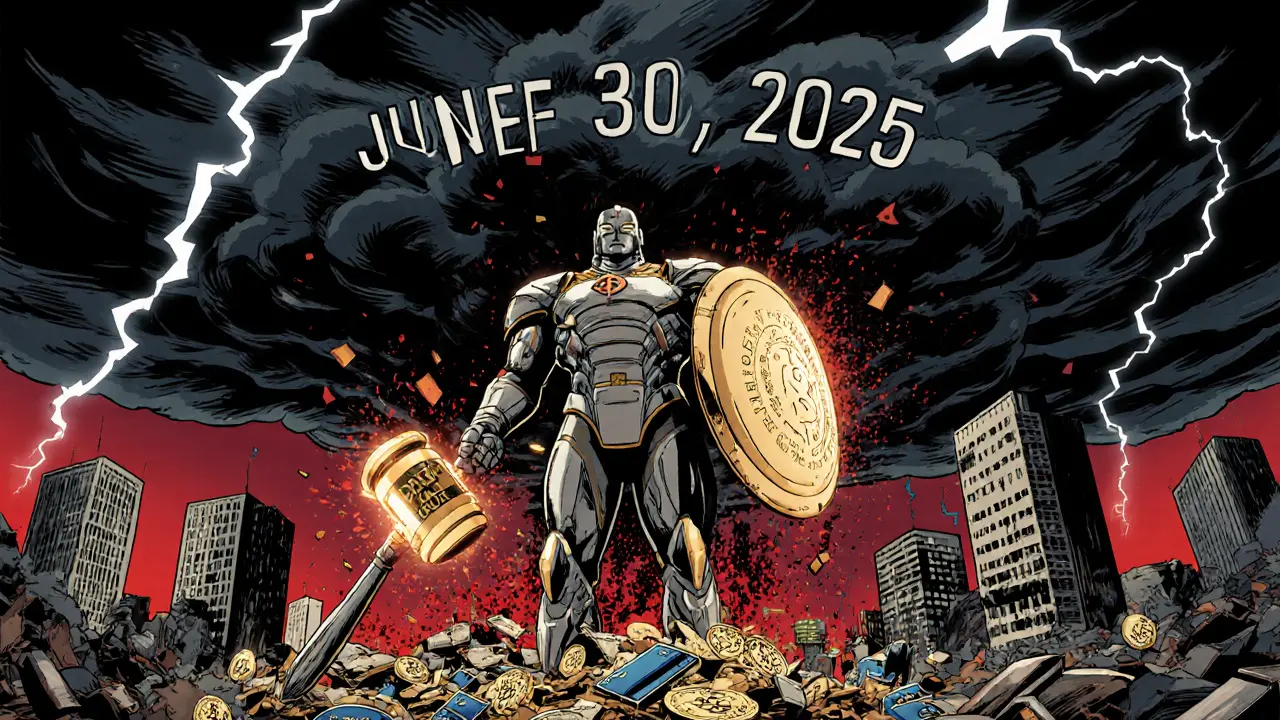Singapore Crypto Compliance Calculator
Important: This calculator estimates compliance costs based on MAS regulations effective June 2025. Deadline: June 30, 2025. Non-compliance results in fines up to SGD 200,000.
Compliance Cost Calculator
Compliance Summary
DTSP License Required
Deadline: June 30, 2025
Minimum Capital Reserve
SGD 0
Compliance Officer
SGD 0
Travel Rule Software
SGD 0
TOTAL COST
SGD 0
Warning: Failure to comply by June 30, 2025 may result in fines up to SGD 200,000 and forced shutdown.
For years, Singapore was seen as one of the most welcoming places in the world for crypto companies. But everything changed in June 2025. The Monetary Authority of Singapore (MAS) didn’t just tighten the rules-it slammed the door shut on most new crypto businesses. If you’re running or planning to launch a crypto service from Singapore, you need to understand exactly what’s happening. This isn’t a gentle nudge. It’s a full regulatory overhaul with real consequences.
Why MAS Changed Course
MAS didn’t wake up one day and decide to crack down on crypto for no reason. The trigger was something deeper: reputation. Singapore has spent decades building its name as a trustworthy, stable financial center. But over the last few years, crypto firms started using Singapore as a branding tool. They’d register here, get the “Singapore-regulated” label, and then serve customers in places with no rules at all. MAS saw this as a dangerous game. They weren’t just worried about money laundering or fraud-they were worried about their own credibility. The Financial Services and Markets Act 2022 (FSMA) gave MAS the legal power to act. Section 137 of the law says: if you’re based in Singapore, you’re under MAS control-even if your servers are in Dubai, your users are in Nigeria, and your money flows through a Swiss bank. That’s not normal. Most regulators only care about what happens inside their borders. MAS cares about what you do from Singapore, no matter where it goes.The DTSP License: A License That’s Almost Impossible to Get
The new system requires every crypto business operating from Singapore to hold a Digital Token Service Provider (DTSP) license. Sounds simple, right? Not anymore. In a public statement on June 6, 2025, MAS said it would issue licenses only in “extremely limited circumstances.” That’s code for: we’re not giving out new licenses anymore. Before this, around 200 companies had applied or held provisional licenses. By the June 30, 2025 deadline, experts estimate only 15 to 20 will still be compliant. Why? Because the requirements are brutal.- You must have a minimum capital reserve-enough to cover losses if things go wrong.
- You must hire a Singapore-based compliance officer. Not a remote one. Not a consultant. A full-time, on-the-ground employee with real qualifications. Salaries for these roles now range from SGD 150,000 to SGD 250,000 per year.
- You need annual independent audits by firms approved by MAS.
- Your cybersecurity systems must meet strict standards-no exceptions.
The Travel Rule: Tracking Every Big Crypto Transaction
If you send or receive more than SGD 1,500 (about USD 1,100) in crypto, MAS now requires you to collect and share detailed information about both parties. That includes full names, government ID numbers, and account details. This is called the Travel Rule, and it’s not optional. Implementing this isn’t like flipping a switch. You need specialized software that can securely exchange data with other platforms worldwide. Costs range from SGD 50,000 to SGD 200,000 depending on how many transactions you handle. Smaller firms can’t afford this. Many simply shut down. And it’s not just about tech. You have to make sure your systems comply with both Singapore’s rules and the rules of the countries your users are in. That’s a legal minefield. Deloitte estimates this doubles compliance costs for firms operating across borders.
Consumer Protection: No More Credit Cards for Crypto
MAS doesn’t just care about companies. They care about regular people too. In September 2024, they introduced new consumer rules that hit hard:- Crypto platforms can no longer let customers buy digital assets with credit cards.
- You must assess whether a customer understands the risks before letting them trade.
- You must clearly warn users that crypto prices can crash overnight.
What Happens If You Don’t Comply?
There’s no grace period. No warning. No “try again next year.” The June 30, 2025 deadline was final. If you didn’t get your DTSP license by then, you’re breaking the law. Penalties are severe:- Fines up to SGD 200,000 (USD 147,000)
- Potential imprisonment for executives
- Forced shutdown of all operations
The Human Cost: Jobs, Talent, and the Brain Drain
This isn’t just about companies. It’s about people. Crypto-related job postings in Singapore dropped 37% in Q1 2025 compared to the last quarter of 2024, according to LinkedIn data. Developers, compliance officers, and operations staff are leaving. Some moved to Dubai or Switzerland. Others left the industry entirely. The salary for a qualified compliance officer has become a barrier. Companies that once hired junior staff for this role now need someone with years of experience in AML, international law, and financial regulation. Few people have that combo. And those who do are being poached by banks and hedge funds.


anthony silva
November 15, 2025 AT 18:26So MAS just killed crypto in Singapore and now wants a gold star for being "responsible"? Cool story bro. I bet the compliance officers are sipping lattes in their SGD 250k offices while the rest of us get to watch this whole thing turn into a ghost town. 🤷♂️
David Cameron
November 17, 2025 AT 03:13They didn't ban crypto. They banned the illusion that you can be a global player and still pretend to be a local regulator. Singapore’s playing 4D chess while everyone else is still on checkers. The cost of credibility isn't just money-it's the silence of the startups that used to fill the co-working spaces.
Sara Lindsey
November 17, 2025 AT 19:17Look I get it the rules are crazy but think about it this way no more sketchy projects pretending to be legit because they have a Singapore address now that’s actually a win for real builders who want to do right by their users 💪🔥
Kevin Hayes
November 19, 2025 AT 00:13The regulatory architecture MAS has implemented is not merely stringent-it is a structural reconfiguration of the financial ecosystem. The DTSP licensing framework, when viewed through the lens of international financial jurisprudence, represents a paradigmatic shift toward extraterritorial compliance enforcement. This is not regulatory overreach-it is the logical culmination of a jurisdictional imperative to prevent systemic reputational contagion.
Albert Melkonian
November 20, 2025 AT 01:10It’s important to recognize that Singapore is not rejecting innovation-it is filtering it. The goal isn’t to stop progress but to ensure that progress doesn’t come at the cost of trust. The few who remain will be the ones who built for sustainability, not hype. That’s not a loss. That’s evolution.
Byron Kelleher
November 20, 2025 AT 10:15honestly i feel bad for the devs who moved here hoping to build something cool. now they gotta choose between moving again or switching careers. i hope someone’s helping them out. this whole thing feels like a slow burn.
Cherbey Gift
November 22, 2025 AT 09:44MAS didn't shut down crypto they just made it so expensive only billionaires and their pet compliance bots can play now. Meanwhile in Nigeria we’re still using Telegram bots to swap USDT and nobody’s asking for a SGD 250k officer to sign our receipts 😂🌍
Anthony Forsythe
November 23, 2025 AT 06:56Think about it. This isn’t just about regulation. This is about identity. Singapore spent decades crafting a brand of stability, of order, of quiet power. And now, in one brutal stroke, it has chosen to sever its soul from the chaotic, beautiful, dangerous wild west of crypto. It’s like a monk burning his favorite book because it had ink on the margins. The purity is sacred-but what was lost in the fire?
Kandice Dondona
November 25, 2025 AT 01:01ok but can we just take a sec to appreciate how much this protects regular people?? no more credit card crypto gambling 😭❤️ thank you MAS you’re doing god’s work 🙏✨
Becky Shea Cafouros
November 25, 2025 AT 20:07the travel rule is ridiculous. who’s gonna pay 200k for software to track every 1100 dollar transfer? this isn’t regulation it’s a tax on existence.
Drew Monrad
November 26, 2025 AT 11:48Oh wow, Singapore just became the financial equivalent of a gated community where only the 1% can afford the keycard. Meanwhile, the rest of the world is building decentralized systems that don’t need permission. This isn’t control-it’s a funeral for relevance.
Cody Leach
November 28, 2025 AT 01:08the compliance officer salary alone is a red flag. if you need to pay 250k a year just to have one person who knows the rules, maybe the rules are too complex. not the people.
sandeep honey
November 28, 2025 AT 08:47they say Singapore is strict but look at India we still can’t even get a clear stance on crypto. at least here you know where you stand. no gray zone. no waiting. just rules. i respect that.
Mandy Hunt
November 28, 2025 AT 22:09you think this is about compliance? no. this is about the deep state. MAS is working with the IMF and the Fed to kill crypto before it kills fiat. they’re scared. the dollar is crumbling and they know it. this is a cover-up. don’t fall for it.
alex piner
November 29, 2025 AT 19:48im not saying its right but i get why they did it. so many scams used singapore as a badge and now people think its safe. if this stops even one person from losing their rent money then its worth it
Gavin Jones
November 30, 2025 AT 15:26It is an admirable demonstration of regulatory foresight. One cannot sustain a global financial hub while permitting regulatory arbitrage. The cost of maintaining integrity far outweighs the short-term allure of speculative capital. Singapore has chosen legacy over liquidity.
Mauricio Picirillo
December 2, 2025 AT 10:38hey if you’re still trying to launch something here just chill. go to dubai or portugal. the vibe’s better and the coffee’s cheaper. you’ll thank yourself later 🤙
Liz Watson
December 4, 2025 AT 02:25Of course the ‘crypto haven’ label was always a marketing gimmick. Anyone who thought Singapore was truly open to crypto was either naive or complicit. Now the adults are in charge. The amateurs? They got what they deserved.
Rachel Anderson
December 5, 2025 AT 06:29This isn’t just a crackdown-it’s a eulogy. The dream of decentralized finance in the heart of Asia… extinguished. The silence in the offices where devs once coded through the night… deafening. The future isn’t dead. It’s just… not here anymore.
Hamish Britton
December 5, 2025 AT 11:21hard to argue with the logic. if you want to be a financial center you can’t let every random startup slap your name on their website. better to be small and clean than big and dirty.
Robert Astel
December 5, 2025 AT 22:09you know what’s wild? the compliance officers they’re hiring? they used to be the same people who worked at crypto firms 2 years ago. now they’re the gatekeepers. it’s like the rebels became the empire. and the empire? it’s got a 250k salary and a 401k. the circle of life, baby.
Andrew Parker
December 6, 2025 AT 20:19they didn’t just ban crypto… they buried it alive. 🕯️ the silence is louder than any blockchain. i miss the chaos. i miss the hope. i miss the late-night calls from people saying ‘we’re gonna change the world.’ now? now they’re just filling out forms. and crying. always crying.
Katherine Wagner
December 7, 2025 AT 23:47why do they need a Singapore-based officer if the servers are in Dubai? this makes zero sense. if you’re not here you’re not under our jurisdiction. unless you’re Singapore… then suddenly you’re everywhere. hypocrites.
ratheesh chandran
December 8, 2025 AT 21:39they say its about purity but its really about control. people dont want to be controlled. they want to build. now theyll go somewhere else. and singapore? theyll be left with empty buildings and a very expensive compliance department